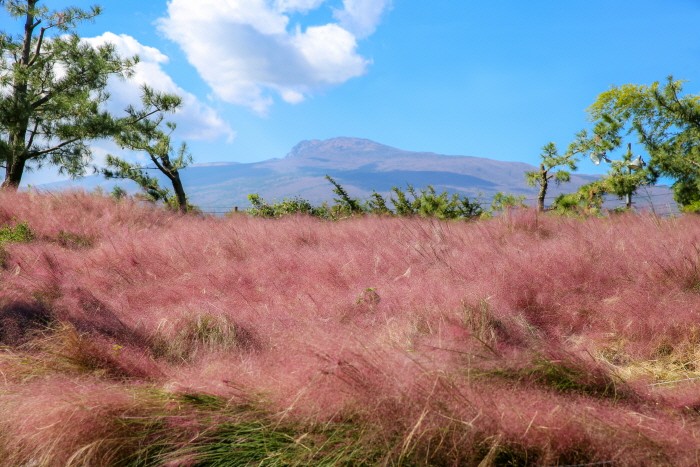Pink Muhly has been extremely popular since it was first unveiled six years ago at a wildlife botanical garden in Jeju Island, Korea. The plant looks like a pink reed but it is a tall willowy grass. The weird, yet exquisite native US grass, is emerging as the most sought after autumn plant to see. When the wind blows, the pink and purple colors combine for a beautiful watercolor scene. Sunset draws the most spectators when the plant’s colors vividly contrast with the autumn sky. For these reasons it is the most prominent attraction of the autumn festival. However, South Korea's Ministry of Environment classified Pink Muhly as a second-class harmful species during an ecological risk assessment that took place in December of last year. Class 2 harmful plants are determined to have a moderate impact on the ecosystem, with a need to carefully observe their future effects on the local environment.
 |
| ▲ Ecological Risk Assessment Rating Criteria. (Photo from the Ministry of Environment) |
Ecological risk assessments by the Ministry of Environment have three classes for exotic species. Grade 3 species are determined to have a low ecological impact, so they do not require any additional monitoring. Grade 2 species are associated with normal ecological hazards, but can have a negative long-term impact so they must be monitored. Grade 1 species are the most invasive and need to be controlled or eliminated before they destroy the domestic ecosystem.
Pink Muhly is a perennial plant of the crest family and is native to the southeastern part of North America, including Florida, Louisiana and Georgia. Pink Muhly is a strong disease resistant plant that can survive in wet, hot, or cold weather. However, if we plant pink muhly grass next to rice paddies, the rice would fail due to the strong viability of the muhly plant. There are concerns that this may lead to the disappearance of rice plants in Korea.
 |
| ▲ A View of Pink Muhly Festival 2020. (Photo from Yeogiyou) |
In 1992, during the United Nations Conference on Environmental Development in Rio, Brazil, delegate nations adopted the “Convention on Biological University (CBD).” The goal of the convention is to provide an “international legal instrument for the conservation of biological diversity, the sustainable use of its components, and the fair and equitable sharing of the benefits arising out of the utilization of genetic resource.” 196 countries, including South Korea, signed the convention. As a result, each signatory nations is striving to uphold their commitment to the convention by doing all they can to protect the biodiversity of their ecosystems.
Diverse genetic resources are important for our existence. The ingredients of many existing medicines come from nature. For example, aspirin is made of willow tree bark and morphine is extracted from poppies. Imagine if we were to lose some species forever, many of which have properties we have yet to uncover. The costs would be astronomical. The International Union for Conservation of Nature (IUCN) declared 467 species extinct from 2010 to 2020 alone. We have listed about 1 million species altogether, which means that over the past decade, the rate of extinction has increased by 467 times over the natural rate of extinction. If things keep going this way, the population of wild species could be reduced by two-thirds by the end of 2020 as compared to 1970. This is important because the loss of flora and fauna can eventually lead the extinction of humankind.
The importance of protecting our biodiversity is why the Ministry of Environment recommends visitors who travel to experience the Muhly grass in all its splendor, not get too close to the plant and risk spreading the seeds in uncontrolled areas. Take pictures from a distance and brush off your coats after you enjoy the beautiful landscape views. In addition, local governments need to stop the thoughtless planting of Pink Muhly grass and help the nation’s efforts to protect the indigenous species of Korea.
박지안, 김건희, 정예지 dankookherald@gmail.com

![[Campus Magnifier] Let's Surf the Library!](/news/photo/202404/12496_1765_4143.jpg) [Campus Magnifier] Let's Surf the Library!
[Campus Magnifier] Let's Surf the Library!
![[Campus Magnifier] Let's Surf the Library!](/news/thumbnail/202404/12496_1765_4143_v150.jpg)





